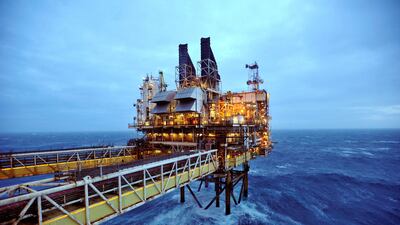Live updates: follow the latest news on Russia-Ukraine
Oil prices rose on Wednesday after the EU proposed a phased Russian oil embargo, as the world's largest trading bloc intensifies its sanctions on Moscow in response to its military offensive in Ukraine.
Brent, the global benchmark for two thirds of the world's oil, was up 3.16 per cent to $108.3 per barrel at 1.34pm UAE time on Wednesday. West Texas Intermediate, the gauge that tracks US crude, was 3.26 per cent higher, trading at $105.67 a barrel.
"Oil prices are in recovery mode as investors eye the US crude oil inventory data, which is likely to signal a tighter supply," said Naeem Aslam, chief market analyst at Avatrade.
"Traders are also monitoring the potential of possible sanctions on Russian oil by the EU ... the EU is determined to punish Russia for its actions in Ukraine, but the fear among traders is that the region may be underestimating a large number of factors that could hurt the region’s growth."
On Wednesday, European Commission President Ursula von der Leyen proposed a ban on Russian oil imports and said it would ban three Russian banks, including the country's largest lender, Sberbank, from the Swift international payments system as part of a sixth round of sanctions linked to the war in Ukraine.
However, her proposal would require approval from the EU's 27 member states – a complicated move considering Europe's dependence on Russian crude.
Europe is the destination for nearly half of Russia's crude exports, according to the International Energy Agency (IEA). In 2021, the bloc imported 155 billion cubic metres of natural gas from Russia, which accounted for about 45 per cent of EU gas imports and close to 40 per cent of its total gas consumption, the agency said.
Despite such heavy reliance, some countries, such as Germany and Austria, have shown willingness to wean themselves off their dependence on Russian oil. Hungary and Slovakia, which received respectively 96 per cent and 58 per cent of their crude and oil products from Russia last year, according to the IEA, said they will not adhere to an oil embargo by the EU.
"We haven’t seen a significant fall below the $100 per barrel in US crude, and the risks remain tilted to the upside as the European nations now consider walking away from the Russian energy, before Russia cuts its energy supply to them, after it turned off the tap for Poland and Bulgaria," said Ipek Ozkardeskaya, senior analyst at Swissquote Bank.
The oil market is expected to remain tight as even Opec+, a super group of 23 producers, too is not expected to contribute much to easing the supply constraints.
"The latest reports suggest that the [Opec+] member states couldn’t even meet their actual production target due to capacity constraints, operational disruptions, and lower investment," Ms Ozkardeskaya said.
Oil prices have been extremely volatile this year, affected by the conflict in Ukraine and concerns about demand in China as well as tighter US crude inventories.
US crude inventories decreased by 3.48 million barrels last week, according to the latest report from the American Petroleum Institute.
Both Brent and WTI benchmarks posted their fifth straight monthly gain at the end of April. Brent ended the month 1.3 per cent higher and WTI surged 4.4 per cent during the period.
"In the bigger picture Brent crude is still in a broader $100 to $120 range and WTI in a $95 to $115 range. Only a weekly close above or below those levels signals a new directional move," said Jeffrey Halley, senior market analyst at Oanda.
China, the world's largest importer of oil, has introduced movement restrictions in its largest city, Shanghai, as well as in the capital Beijing.
Millions of people have had to stay indoors in Shanghai for more than a month as the government carried out mass testing of its population as part of its zero-Covid policy.
Continuing restrictions could potentially affect prices, Ms Ozkardeskaya said.
"The Chinese lockdown, and broader economic slowdown due to China disruptions, and tighter financial conditions ... [could] weigh on oil demand and pull prices lower in the coming quarters."

